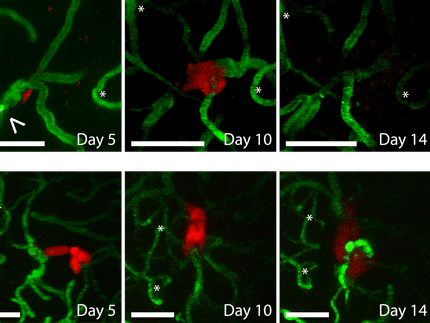How cancer cells avoid shutdown
Researchers unravel mechanisms by which a protein that promotes tumour growth is produced during stress
Advertisement
A mechanism beyond the level of gene regulation, which is often the underlying reason for changes in protein levels, does enable the strong accumulation of a tumour promoting protease in stressed cancer cells. The group of BIOSS researcher Prof. Dr. Thomas Reinheckel teamed up with BIOSS investigator Prof. Dr. Sabine Rospert and their colleagues from the University Medical Center Freiburg, Prof. Dr. Elmar Stickeler and Dr. Peter Bronsert, in order to unravel mechanisms by which stress-resistant production of cancer promoting proteins occurs. They published their research findings in the Journal of Biological Chemistry.
Breast cancer is the second most common cause of cancer deaths in American women. The most critical step in progression of the tumour is the switch from contained cancer to the seeding of new tumours at distant sites – so called metastases. The process of developing metastases is stressful for cancer cells because big tumours suffer from poor oxygen and nutrient supply. Therefore, many cancer cells shut down the production of new proteins and cannot make it to a metastatic state. However, some cancers find ways to overcome these obstacles and synthesize proteins that promote their further tumour growth and metastasis.
The specific protein concerned in the team’s study is the protease cathepsin L, a certain enzyme. It is long known that high levels of this protease in breast cancers are associated with high metastasis rates and poor survival of the patients. On the other hand, cancer stress conditions prompt tumour cells to down-regulate synthesis of most proteins to save energy, mainly by inhibiting the translation of mRNA into protein. However, the researchers observed that cathepsin L levels are maintained in mouse and human breast cancer tissues and cells even when these were exposed to stress. To address this, the research team analysed the association of various mRNAs to so-called polyribosome complexes. These complexes are made of an mRNA with several protein-synthesizing ribosomes associated to this mRNA. This assembly line ensures efficient synthesis of large quantities of a protein from a single mRNA molecule. The researchers showed that cathepsin L mRNA is constantly associated to polyribosome complexes even under stress conditions. This indicates highly efficient translation of cathepsin L although production of other proteins was shut down. This advantage of cathepsin L mRNA seemed to be dependent on its localization within the cell whereby cathepsin L mRNA might escape from stress granules, which are translationally silent protein and mRNA accumulations formed in stressed cells.
Original publication
Martina Tholen, Julia Wolanski, Britta Stolze, Marco Chiabudini, Mieczyslaw Gajda, Peter Bronsert, Elmar Stickeler, Sabine Rospert, and Thomas Reinheckel (2015). Stress-resistant Translation of Cathepsin L mRNA in Breast Cancer Progression. Journal of Biological Chemistry 290.25.


















































